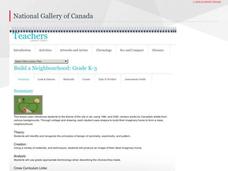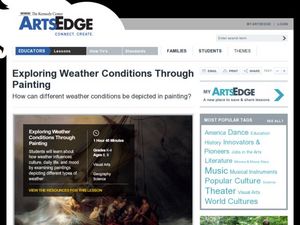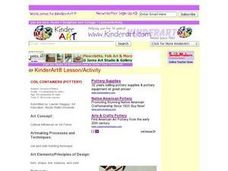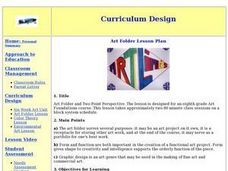J. Paul Getty Trust
O Greek Shape! O Fair Pose!
Everything old is new again. The Los Angeles J. Paul Getty Museum presents a lesson on how Greek black-figure painting influenced eighteenth century Neoclassical artists. After looking at a series of examples, class members create their...
Akron Art Museum
Storytelling Resist
The illustrations of Ezra Jack Keats in The Snowy Day inspire young artists to examine shapes in illustrations and to use these shapes to create their own watercolor resist painting.
J. Paul Getty Trust
Shaping Ideas: Symbolism in Sculpture—Lesson 3
The final session in a sequential, three-lesson sculpture study designed by the education staff of the J. Paul Getty Museum in Los Angeles has class members using the criterial they developed to critique each others' symbolic sculptures.
K12 Reader
Storytelling and Folklore
Stories are passed down orally in many cultures. Learn about the ways that storytelling can shape a society with a reading passage about Native American folklore and myths. After they finish reading, kids complete five reading...
National Gallery of Canada
Build a Neighbourhood
What's special about your neighborhood? Build one with your class to find out. Individuals create their dream homes that, when completed, will be placed together around a green space in order to create a neighborhood. Learners also...
Richland County School District One
Falling Into Geometry Through Paper Art
New-to-school learners create a fall quilt consisting of three different paper geometric quilt squares. They use various geometric shapes that when assembled will form a scarecrow, pumpkin, and a crow. Assembly will require sorting...
Curated OER
Exploring Weather Conditions Through Painting
Your advanced class will paint a picture of a particular weather condition. In this painting lesson students describe elements of art in pieces of artwork. They analyze the weather and seasons in the artwork. The students use paper,...
Curated OER
Get Crafty! Integrate Art and Science
By combining diverse subjects, you will create some of your most memorable lessons.
Curated OER
Elements of Art
Third graders discover elements in visual art. In this visual art lesson, 3rd graders explore the use of line, shape, and color in visual art. After reviewing works of art, students create unique art pieces. Technology resources provided.
Curated OER
Shapes and Introduction to Geometry
Students make a quilt. In this geometry instructional activity, students discuss patchwork quilts and learn some different geometric shapes and patterns that are commonly used. Students explore designs with triangles and squares and then...
Curated OER
Falling Into Geometry Through Paper Art
Students explore geometric shapes. In this kindergarten geometry lesson plan, students create a fall quilt consisting of three different paper geometric quilt squares that when assembled form a scarecrow, a pumpkin, and a...
Curated OER
The Art Box
Sixth graders create a 3-D Art Box in this design-oriented art project for the 6th grade. Rubric is included for grading purposes. The elements of design are covered and applied (includes line, form, texture, shape, value, color, and...
Curated OER
Geometry, Shapes and Public Sculpture
Students explore characteristics of geometric shapes. They observe geometric shapes and forms in public sculpture. Students create a unique sculpture of their own using basic three dimensional shapes. Additional cross curriculum...
Curated OER
Soft Sculpture Birds
Art can mimic life, and animals are always interesting subjects. Learners create large soft sculptures (stuffed) birds using paper, paint, and other basic collage materials. They view images of birds, and discuss bird traits and shapes....
Curated OER
Coil Pots
Children learn by doing. Here, they discuss cultural uses of containers, coil and slab techniques, functional aesthetics, and the principles of art and design. The entire process for making a coil pot is fully described here to make the...
Curated OER
Clowning Around: Drawing
Kids create a clown out of shapes. They work to show emotions while practicing their drawing skills. Pupils use circles, triangles, squares, oil pastels, and their imagination to draw, color, and decorate a sad or happy clown. Tip: Have...
Curated OER
Tessellations: Geometric Patterns
Students create tessellation drawings using repeating geometric shapes.
Curated OER
Fashion Design From Nature
Some gorgeous images will inspire your learners to create different fashion designs from a wide variety of natural sources. Students study color, pattern, texture, shape and form to create their own original piece in this vocational...
Curated OER
Poetic Form
Students read Red Boots On and explore prepositions. In this poetic form lesson, students analyze the use of prepositions in the poem. Students might also explore the rhymes or objects. Students write original poems...
Curated OER
Finding Polygons in Cubist Art
Fourth graders explore geometric properties and relationships in a two-dimensional work of art. They first search for and identify polygons in a Cubist painting and then use polygons to create their own Cubist portrait of a classmate.
Curated OER
Northwest Native American Art
Eighth graders first study the art of the U.S. Northwestern Coast Native American peoples. They select an image or make their own and make a drawing and then make a 6-inch linoleum block print.
Curated OER
Art Folder and Two Point Perspective
Eighth graders examine how to create a 3-D effect on a flat surface and draw in two-point perspective. They view and discuss elements of design, analyze artwork by M.C. Escher and Roy Lichtenstein, and design and create an art folder.
Curated OER
Famous Authors Biographical Data Form
Who wrote To Kill a Mockingbird? What about Wuthering Heights? Prodigal Summer? Encourage learners to study the authors of their beloved books. This form will help them organize information as they learn about different authors. After...
Curated OER
Shape & Form
Learners analyze the difference between shape and form. They identify, explain and use the basic elements of design and determine that forms are three-dimensional and shapes are two-dimensional. They sketch it on their paper and then...























